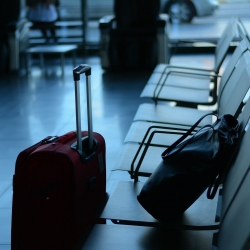To provide the best experiences, we use technologies like cookies to store and/or access device information. Consenting to these technologies will allow us to process data such as browsing behaviour or unique IDs on this site. Not consenting or withdrawing consent, may adversely affect certain features and functions.
The technical storage or access is strictly necessary for the legitimate purpose of enabling the use of a specific service explicitly requested by the subscriber or user, or for the sole purpose of carrying out the transmission of a communication over an electronic communications network.
The technical storage or access is necessary for the legitimate purpose of storing preferences that are not requested by the subscriber or user.
The technical storage or access that is used exclusively for statistical purposes.
The technical storage or access that is used exclusively for anonymous statistical purposes. Without a subpoena, voluntary compliance on the part of your Internet Service Provider, or additional records from a third party, information stored or retrieved for this purpose alone cannot usually be used to identify you.
The technical storage or access is required to create user profiles to send advertising, or to track the user on a website or across several websites for similar marketing purposes.
 Data from thousands of employees across the country has been aggregated in a new report, detailing the mental wellbeing of the workforce over the course of the year. The research from 87 percent, a digital platform that provides mental health assessment and support to businesses and their employees, shows how the workforce has struggled with the mental pressures of Covid-19. Since March, circumstances at work and pressures in our personal lives have badly affected our mental wellbeing. (more…)
Data from thousands of employees across the country has been aggregated in a new report, detailing the mental wellbeing of the workforce over the course of the year. The research from 87 percent, a digital platform that provides mental health assessment and support to businesses and their employees, shows how the workforce has struggled with the mental pressures of Covid-19. Since March, circumstances at work and pressures in our personal lives have badly affected our mental wellbeing. (more…)








 With the continuous impact of the pandemic on people’s mental health due to isolation, work uncertainty, and anxiety over health, the topic has been dominating the news, begging the question of how we can achieve accessible and cost-effective treatment for all and prevent the expected acceleration of mental health issues in the coming months. As we juggle a different type of work-life balance brought about by working from home and the added worry of how the pandemic is affecting us, there is no doubt that our daily lives have been disrupted. The statistics are alarming;
With the continuous impact of the pandemic on people’s mental health due to isolation, work uncertainty, and anxiety over health, the topic has been dominating the news, begging the question of how we can achieve accessible and cost-effective treatment for all and prevent the expected acceleration of mental health issues in the coming months. As we juggle a different type of work-life balance brought about by working from home and the added worry of how the pandemic is affecting us, there is no doubt that our daily lives have been disrupted. The statistics are alarming; 
 Research by employee benefits provider
Research by employee benefits provider 
 As lockdown restrictions and tier systems continue to cause chaos,
As lockdown restrictions and tier systems continue to cause chaos, 
 A December 2020 online study of 1,136 employed U.S. adults carried out by wellbeing provider
A December 2020 online study of 1,136 employed U.S. adults carried out by wellbeing provider 
 There’s no question what has occupied the majority of attention for risk managers during 2020. But
There’s no question what has occupied the majority of attention for risk managers during 2020. But 
 The repercussions of Covid-19 for the small business community have been particularly ruinous. Recent figures paint a worrying picture, revealing that approximately 76,300 SMEs in London alone ceased operations completely as a direct result of the pandemic, with lockdowns costing from £30,000 to £75,000 for one in ten small businesses. As the most vulnerable business segment in the current crisis, SMEs needed the biggest support and, by the end of April, had already received over £4 billion via the government’s
The repercussions of Covid-19 for the small business community have been particularly ruinous. Recent figures paint a worrying picture, revealing that approximately 76,300 SMEs in London alone ceased operations completely as a direct result of the pandemic, with lockdowns costing from £30,000 to £75,000 for one in ten small businesses. As the most vulnerable business segment in the current crisis, SMEs needed the biggest support and, by the end of April, had already received over £4 billion via the government’s 
 A lack of balance through lockdown has been felt most dramatically by Brits living in house shares according to new research released by
A lack of balance through lockdown has been felt most dramatically by Brits living in house shares according to new research released by 
 A large number of British companies companies say they plan to install monitoring software of some kind to keep an eye on employees working from home, according to a new survey. Around 20 percent of employers said their firms have either implemented, or plan to implement, online software which monitors their remote workers.
A large number of British companies companies say they plan to install monitoring software of some kind to keep an eye on employees working from home, according to a new survey. Around 20 percent of employers said their firms have either implemented, or plan to implement, online software which monitors their remote workers. 
 The location of a potential employer’s workplace is becoming more important to workers – despite a surge in people working remotely, according to outplacement firm
The location of a potential employer’s workplace is becoming more important to workers – despite a surge in people working remotely, according to outplacement firm 
 The pandemic has seriously altered how we work. According to statistics published by the
The pandemic has seriously altered how we work. According to statistics published by the 








January 5, 2021
We shouldn’t become village idiots in our new ways of life
by Mark Eltringham • Cities, Comment, Flexible working, Technology